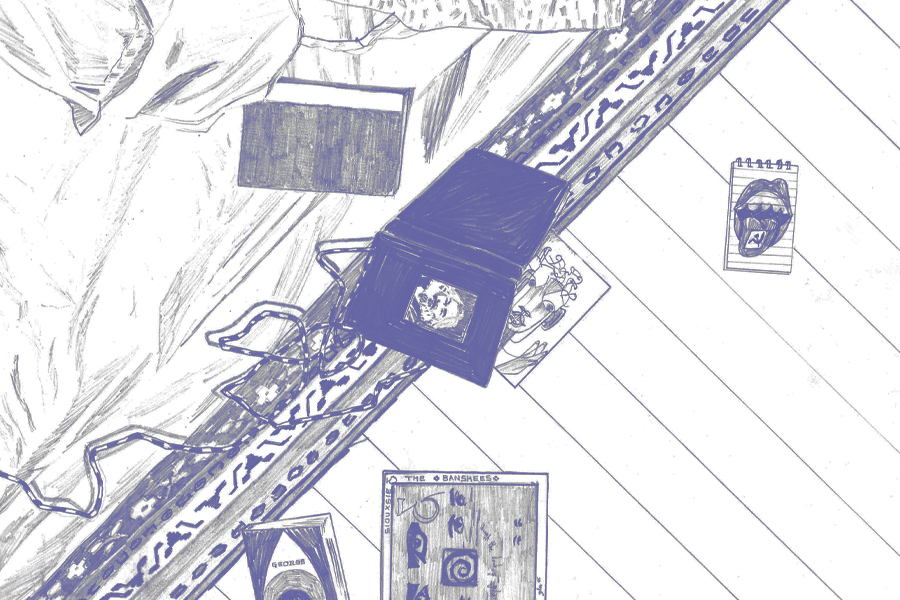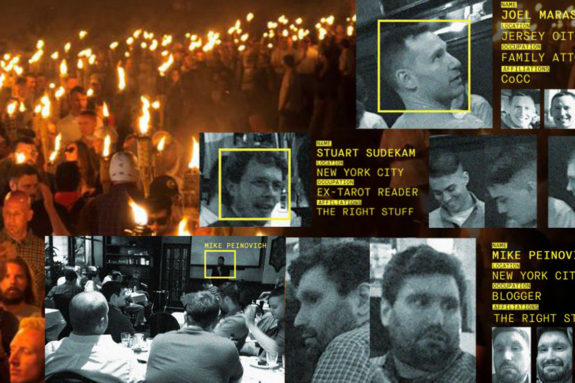To the barricades, through the looking glass.
Once upon a time, way back in 2010, having just read his brilliant book Capitalist Realism, I went to see Mark Fisher speak. I walked in late and he was in the midst of denouncing the one-day strike as a pantomime, a meaningless echo of uprising. (He was right, as he was about so many things.) He moved through the financial crisis, to the soulless thing that neoliberalism had made of the university, to a demand to repoliticize mental health. I sat enthralled, too nervous to go say hello afterward. I wish I had.
Fisher died in 2017, leaving anyone who had read him bereft. I find myself, while reading and rereading, wondering what he would have thought of The Favourite or the new Robyn album; longing for his caustic words on the meltdown of the Theresa May government; wishing he had been here to tear “hopepunk” to shreds; wondering too what he would have made of AOC.
The new k-punk collection, all 824 pages of it, is out now from Repeater Books, gathering a decade and a half of Fisher’s writings on pop culture, politics, and theory. It contains everything from blog comment policies to the unfinished introduction to what would have been his next book. Even a quick skim will remind you that Fisher was a much more audacious, nuanced, and flat-out weird writer and thinker than almost anyone the left can claim these days.
Trying to do justice to a now-gone writer who regularly blew your mind is an impossible task, and yet someone who so regularly took aim at sacred cows — starting a piece with “Orwell is wrong about everything, but especially 1984” — should not become one himself. It’s hard to imagine him having any patience with such treatment, anyway. The combination of humility and raw confidence with which he wrote would prevent, I hope, any enjoyment of sainthood.
The only way to treat him right is to read him with the same eye for ruthless critique that he always brought. The same vitality that makes it impossible to imagine him gone courses through this book, whether he’s writing about the calcification of Glastonbury, the bloodless corpse of New Labour, or the privatization of stress. His long posts often come to abrupt ends; there is no wind-down, everything is full-tilt and then crashes to a halt, winded and satisfied with itself (but never smug, no, Fisher always had the bone-deep understanding that smugness is counterrevolutionary).
“We might now be able to imagine the death of capitalism, yet one problem of capitalist realism remains: our inability to imagine what comes next.”
Fisher is closest in style to Ellen Willis. Like her, he is a brilliant pop-culture critic as well as political observer and actor whose politics were mostly knife-sharp, but capable like all of us of an odd conservative turn. His insistence on popular media as a terrain of struggle is too rare within a new left struggling for direction; Fisher more than anyone understood that the material conditions that drained the vitality from pop music and art and even TV were the same ones that had sucked the life out of the working class. Instead of the innovation that neoliberalism promised us, we’ve just gotten recycled versions of things we’ve seen a million times before, and all of it under the pretense of anti-elitism, of “giving the people what they want.”
Fisher had no patience for this kind of faux-populist tailing. He had a faith in the creativity of the working class that demanded better for and from it. Change — revolution — would not come from pandering but from the masses understanding their own power in all senses. “[T]here’s nothing ‘elitist’ about assuming intelligence on the part of an audience,” he insisted, returning over and over to a defense of a kind of leftist paternalism. (Paternalism, he knew, was the wrong word, but he didn’t quite land on a better one). “It is about having a wager that there is maybe a desire for the strange in people,” he wrote. “People don’t already know what they want and . . . the things which they really end up most valuing may be things which surprise them.”
Whatever we might call such a position, it’s one Fisher performed well. His love for a song or a film that sparks a feeling is contagious. Within a few pages of beginning the music section in the collection I was pulling up bands I’d forgotten or never known to soundtrack my reading. His hatreds — for Alan Moore, say — are not based in some High Culture snobbery but in a frustration with the mistaking of grimness, perhaps, or some other half-evoked emotion, for depth.
In goth, Fisher saw a subculture that could “teach us that egalitarianism is not hostile to, but relies upon, a will-to-greatness, an unconditional demand for the excellent.” The weirdness of Siouxsie Sioux and other such “painted birds” became, in Fisher’s hands, a feminist desire for bursting the confines of biological reproduction, to speed the destruction of a banal, boring world. It was no accident, he pointed out, that Marx himself was drawn to gothic metaphors for capital: “the living flesh it converts into dead labour is ours, and the zombies it makes are us.”
Derrida’s “hauntology” threads through his work, a curious recapturing of a concept developed as part of an extended critique of Marx. In Fisher’s hands it bears the idea of a lost future, of a mourning for a thing that could have been. It’s fitting in a way for his readers now to be haunted by the things he’ll never write. His blog posts still have an immediacy to them, a tang that we’ve largely lost with the rise of the clickbait-fueled “thinkpiece.” Far be it from me of all people to argue that unpaid blogging led to better writing — this is the opposite of what Fisher himself said, insisting that having some security would allow us to produce better — but the shittiness of most of the hot-take era’s writing feels stark when reading a k-punk post on the page. It makes me long for a world where writing could be a form of play. Instead, the lazy bourgeois art that Fisher so despised has only spread; it deserves the tactical nuke he wanted to send down on Glastonbury.
Capitalist Realism exists as a tight little bomb of a book that no one really has any excuse not to read. But in case anyone hasn’t, the concept threads through the k-punk collection; the idea that we live under the shadow of “there is no alternative,” unable to imagine a better way to organize society, let alone to struggle for one. Such “realism,” Fisher explained, was deeply unreal, particularly as we all live in the shadow of climate catastrophe; the tsk-tsking of the centrist ruling class is death drive posing as maturity, and the power of capitalist realism an expression of class decomposition, the fading of class consciousness. Peering through this gloom, Fisher nonetheless glimpsed some endings. After 2008, he wrote, “Neoliberalism is finished as a project, even if it lurches on, thrashing around like a decorticated terminator.”
We might now be able to imagine the death of capitalism, yet one problem of capitalist realism remains: our inability to imagine what comes next. Instead, the left too often gropes for the past, a trend Fisher despised. He insisted that “we must have the courage not to be nostalgic for this lost Fordist world of boring factory work and a labour movement dominated by male industrial workers.” Even communist nostalgia was impossible: “our desire is for the future.” Following Stuart Hall, he pointed out that the left and the labor movement had been too slow to grasp workers’ desire for something better than forty years of forty-hour weeks on the assembly line. The Thatcherites and their ilk had seized the moment to paint their reorganization of the economy as liberation while too many leftists sung (and still sing) paeans to the factory floor. The urgent need now is for a working-class politics that doesn’t love work.
This is where, I suppose, the Vampire’s Castle comes in. Like everything Fisher wrote, his oft-cited “Exiting the Vampire’s Castle” goes hard, but unlike most of what he wrote, the slippage it makes between the nastiness of Twitter pile-ons and the problems of liberal identity politics does his criticism of either issue no favors. Everyone, as Fisher himself pointed out, “has chauvinistic potentials of one kind or another,” yet in the Vampire’s Castle — his name for the social media war of position often conducted via hyperbolic outrage and exhausting, disingenuous engagement — he assumes that only “identitarians” turn social media into traps constructed from the mutual fear of attack, an assumption immediately disproved with a few clicks on rose-emoji Twitter these days. There is just as much of a hipster’s desire to be part of the in-crowd among today’s new socialists, even if they throw the word “class” around more often.

But even when Fisher is infuriating, he is never dull, which is what makes attempts to claim him for normie social democracy so utterly repellent — said reactionary turn in socialist “thought” these days is above all else boring. Though Fisher wrote of the “the luxury of feeling bored” and its potential for sparking new ideas, he insisted upon respect for the intellectual capacities of the working class, insisted that “anti-intellectualism is a ruling-class reflex.” Yet those who see in the Vampire’s Castle a club to whack so-called “identitarians,” or simply anyone to their left, often wind up claiming precisely the opposite: that working-class people are too stupid to be challenged or to challenge our ideas of race, gender, and the fundamental orderings of the world.
We can find a more generous solution for the slash-and-burn tendencies of the would-be left in Fisher’s writings on mental health — particularly on depression, his own and everyone else’s — and his insistence that the left make political demands around it. The “realism” of depression, which “presents itself as necessary and interminable,” with its “glacial surfaces [that] extend to every conceivable horizon,” corresponds to capitalist realism, where all stress has been privatized, all problems made personal. Those moments where the political consensus cracks, as it did during student protests in London in 2010, felt like emerging from depression, Fisher wrote.
In order to permanently lift that haze, Fisher reached for the feminist technique of consciousness-raising, seeing in it a way to make talking about emotion political again, and to raise the confidence of the working class. The “subjugated group consciousness” that might be raised in such a process, he wrote, could create “a new subject — a we that is both the agent of struggle and what is struggled for.” It could be a way to produce collective desires that at the moment might be nameless, a process by which they could be named and brought into being.
The struggle against capitalism, he knew, requires fighting on all levels, through culture no less than parliamentary politics but also, always, in the streets. It requires taking seriously the dance floor no less than the riot as sites of politics; learning from the queer, black, and female producers of dance music about building coalitions that can change the world. The left, he wrote, should let go of “the rigidity of unity” and seek instead coordination among diverse groups; let go of control and offer instead a vision of the world worth fighting for.
k-punk ends with the unfinished introduction to Acid Communism, the project that Fisher was working on when he died. It was an attempt to synthesize the lost future of the 1970s, the moment when the working class began to demand more than Fordist boredom and imagine wilder, freer lives, with a now-revived class politics. It was a vision of red plenty, of collective shared wealth, the new world sighted through the teargas of the 2010 and 2011 uprisings.
The counterculture gets a bad rap these days, blamed even for neoliberalism itself, but in the seventies it inspired rebellion among the workers of Lordstown, Ohio’s GM plant. The pot-smoking, long-haired, and Afro’d workers challenged conservative union leadership as well as their boss, putting forth a still half-formed demand for something beyond boredom. Their 1972 strike was a turning point for American unions; looking back on it now, when that same plant is the latest in a never-ending series of closures, it is hard to remember, as Fisher did, that things could have been otherwise. That there was, for a moment, a possibility of bringing the movements of the sixties together with a communist project, of using feminist consciousness-raising and psychedelia to help imagine what freedom might mean. Without such a politics, the left was outflanked; the UAW had no answer for the Lordstown workers and instead rushed them back to the line. To Fisher, this failure of imagination had devastating consequences.
Along with Ellen Willis, Herbert Marcuse informed Fisher’s Acid Communism; their demands for not just redistribution but freedom give this chapter its buoyancy, its joy. “The attack on capital has to be fundamentally based on the simple insight that, far from being about ‘wealth creation,’ capital necessarily and always blocks our access to this common wealth,” he wrote. “Everything for everyone. All of us first.” Against a drab and depressive realism, he evoked the Temptations’ “Psychedelic Shack” as an explosion of color, of desire. Against a regressive leftist desire for a simpler past, he called for “a counter-exorcism of the spectre of a world which could be free.”
This world which could be free must be built from those desires that break us out of our rituals, our habits, our melancholic attachment to socialisms past and our need to always be scrolling through our smartphones. What are those desires that scare us, a little, to admit? It is those desires that will take us forward into that world of plenty.
The cracks in capitalist realism have only grown wider since Fisher left us, and it is our job to help them grow. “The failure of the future haunts capitalism” — let it not haunt us.





